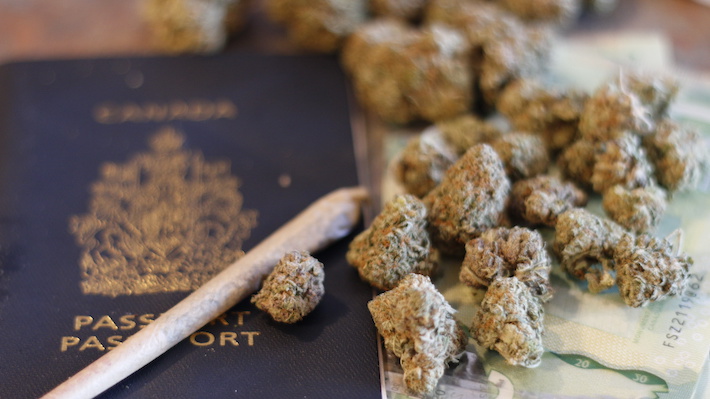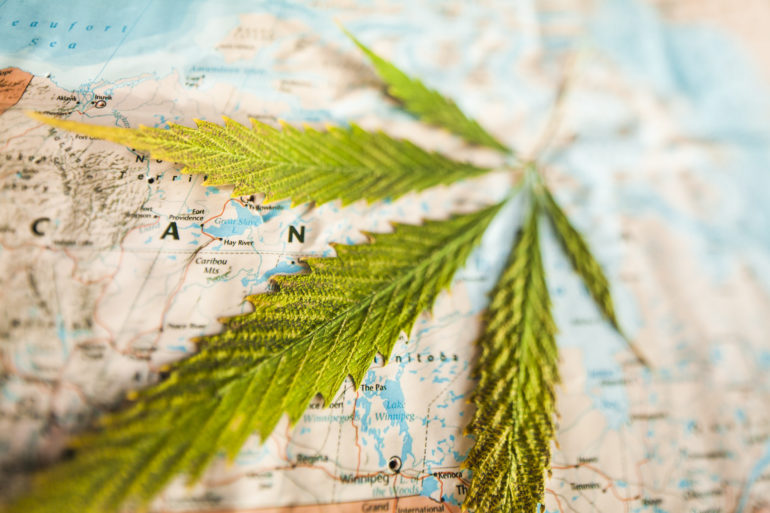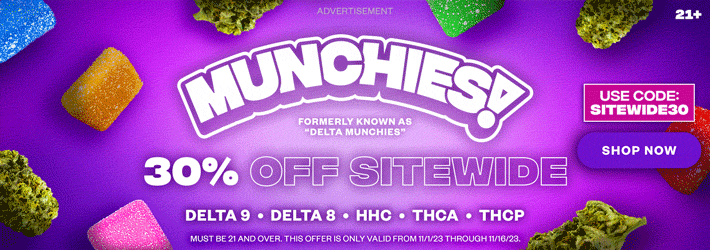Now that hemp-derived CBD is legal at the federal level (with certain restrictions), traveling with CBD is becoming more and more common. But don’t let the legality of CBD oil fool you – you can still run into issues in some cases when you’re flying with CBD.
The problem basically comes down to the complexity of the laws surrounding CBD, specific amounts of other cannabinoids present, the rules in the specific place you’re traveling to and, in some cases, the challenges in enforcing the existing rules fairly.
Summary:
- The 2018 Farm Bill allows you to travel within the US with CBD provided it’s under 0.3% THC
- State laws can differ, though, so it’s always better to check before you travel just in case
- It’s important to bring documentation of the THC level (i.e. lab test results) if you can
- You can bring any form of CBD provided the container for liquids is less than 3.4 ounces/100ml
- Bringing CBD on international flights is generally not advised, but if you check carefully it could be OK
- Taking CBD during a flight could help to ease anxiety, just don’t vape on the plane!
You Can Bring CBD on a Plane (At Least Within the US)
In a nutshell, you can bring CBD on a plane within the United States.
The 2018 Farm Bill legalized CBD oil derived from hemp at the federal level provided it contains less than 0.3% THC by weight, and many individual states either allow recreational or medicinal cannabis anyway.
In principle, and ignoring some details, it’s totally fine to take CBD with you on your flight. But if you’re actually planning on traveling with CBD, it’s better to be aware of the details and prepared for potential issues that may arise.
CBD With Over 0.3% THC is Still Illegal (at the Federal Level)
The wording of the Farm Bill makes it clear that CBD products that contain more than 0.3% THC by weight is still illegal. Because THC is the psychoactive component of the marijuana plant, this is where the law is focused. CBD isn’t such a big deal legally, but in general, wherever you find CBD, there will be some THC too, and that can cause you problems.
This is why “full spectrum” CBD oils aren’t recommended for travel between states.
Full spectrum basically includes CBD, the terpenes that give cannabis its distinctive smell, and other cannabinoids including THC. This means most products marketed as “full spectrum” will contain over 0.3% THC and therefore be illegal at the federal level.
Broad spectrum or CBD isolate products will be fine, because they’ve generally been produced with this limitation in mind.
You Still Shouldn’t Travel with Cannabis
Unsurprisingly, despite legalization in many states, you still shouldn’t fly with marijuana itself.
THC is still a controlled substance in federal law, and you’re bound to run into problems if you’re trying to travel with THC-heavy products.
Even if you’re traveling between states with legal cannabis, federal law is king when it comes to airport rules and US airspace, so it is still illegal to fly with it. Save yourself the trouble and just pick up some more when you arrive.
Airport Security Aren’t Looking for Drugs, But They Could Still Find Your CBD
In general, the TSA aren’t really looking for illegal drugs – they’re focused on threats to passengers and planes instead. They literally state this on their website. But that doesn’t mean they will ignore anything they do find: in fact, they’re obligated to report any violations of state or federal law to the authorities.
So if they find a prohibited CBD product – or if they have reason to suspect a specific product might break the rules – then you could end up in trouble.
The main ways they could detect CBD in your bags is through drug-sniffing dogs or with X-rays.
Dogs are trained to smell the terpenes in cannabis, rather than THC itself, so dogs may detect broad-spectrum CBD extracts (which contain these chemicals). In theory, this shouldn’t be a problem, but you will have to make your case pretty well to avoid problems.
The general message for X-rays is the same. Your bags will be scanned, and if they see something that looks suspicious, they’ll almost certainly open your bag to check it out.
Again, you can explain the situation and hopefully it will be fine, but there is always a risk that they won’t buy it or they’ll try to investigate further.
You Should Bring Documentation Where Possible
This is why you should always bring additional documentation if possible. Check the label on your product carefully to see if you can confirm that it contains less than 0.3% THC. If at all possible, print out the results of lab testing on the product so you can literally prove that it contains less THC than the maximum allowable limit. Really, if you have anything that shows that the product contains less than 0.3% THC and that it was derived from hemp, bring it along.

This might seem like overkill. After all, it’s legal and it’s a free country. But put yourself in the shoes of the TSA agent trying to determine if your product is good. Looking at a bottle of CBD oil, do you know it only contains less than 0.3% THC? Of course it’s impossible to tell by looking at the product – you might not even trust the label – so if you’re being cautious you would need additional information before you let it go.
State Law Can Differ From Federal Law
Finally, federal law isn’t even the only thing you have to worry about. Although the 2018 Farm Bill legalizes hemp-derived CBD at the federal level, state laws can (and do) differ.
There might be different limits on the amount of THC permitted to be present in the product or other differences compared to federal law. It’s better to do a little extra research than be caught out on a technicality when you land.
You Can Travel With Most CBD Products, Including…
CBD Cream
Traveling with CBD in cream or topical form is absolutely fine, provided you abide by standard airline 3-1-1 rule regarding liquids in your carry-on baggage. This includes lotions, and so CBD topical or creams would fall under this restriction.
In short, you can’t take a container larger than 3.4 ounces (100 ml) in your carry-on, and it must fit (along with any other liquids) in a quart-sized re-sealable bag.
Hemp Oil
The same goes for hemp oil: there’s no issue with bringing it with you on a flight, even in your carry-on, provided it’s in a container smaller than 3.4 ounces/100ml. Any larger containers can just be placed into your checked baggage (although you should make sure it’s accessible in case security wants to take a look at it).
CBD Pen
Vape pens of all types are only allowed in your carry-on baggage. They fall under the standard rules for traveling with batteries, and of course they contain liquids too so you’ll have to place them in a re-sealable bag. There is no concern about the size, here, because it’s impossible to exceed the limit with a vape pen.
CBD Bath Bombs
A bath bomb containing CBD is like any other CBD product, except there’s less to worry about in this case because it isn’t a liquid. You can take it in your carry-on or checked baggage, but you should still bring some sort of documentation if at all possible. However, realistically you’re less likely to arouse suspicion with a bath bomb than CBD oil, for example.
CBD Edibles
Edibles are also easier to travel with since they’re solid. However, with most people being aware that cannabis edibles are a thing, it’s important to bring documentation of the THC level if you’re traveling with CBD edibles.
Traveling Within the US (or Canada) is Fine, But International Travel isn’t (Usually) Advised
The 2018 Farm Bill has effectively removed the majority of issues with traveling with CBD within the US. Although there are some caveats, as we’ve covered in this post, the overall picture is that travel with CBD in the US effectively has no restrictions. Similarly, since even recreational cannabis is legal in Canada, you have nothing to worry about when traveling in or to Canada with CBD oil.
Internationally, the picture is very different. Most countries don’t have CBD laws as permissive as the US, and so you’ll need to do some research before you travel. For example, in the EU, the limit for THC in legal CBD products is set at 0.2%, so most US-made CBD products will be technically illegal there.
Other countries’ laws vary quite a lot, and in the majority of cases they will be harsher. This basically means that it isn’t wise to travel with CBD unless you’ve done research on the specific country you’re traveling to beforehand. Things can be more difficult than this, too, because even if the letter of the law says one thing, that doesn’t mean that every airport security agent will understand or be reasonable in practice.
For this reason, unless you have absolute assurance that the country you’re traveling to has an attitude to CBD like that in the US, it’s probably better to leave your CBD products at home. You certainly can in many places, but if you want to avoid issues at the airport it’s really the safest approach.
Taking CBD While Traveling Can Ease Anxiety
Taking CBD during travel can also be a good idea, especially if you get anxious on flights. Reducing anxiety is one of the most well-known benefits of CBD, and so taking a dose on a flight – a little before you take off so it has time to take effect – is a great alternative to anti-anxiety drugs. You should check with your doctor before using CBD for anxiety, of course, especially because it may interact with other medications that carry the “grapefruit warning.”
If you’re already using CBD for anxiety, of course, there is no issue with continuing to do so when you fly. Plus, the side effects of CBD are pretty rare and generally very mild, so there’s no real risk to using CBD on a plane.
For people who get dry skin during travel, CBD creams are a great option. Since the cream will moisturize your skin, it will offer immediate relief, but CBD is also anti-inflammatory and so it will do more than an average moisturizer if you have inflammation related skin problems.
Make Sure Your CBD Container Won’t Smash in Your Bag, and Don’t Vape on the Plane
When you’re traveling with CBD, especially if it’s in your checked baggage, you should consider using shatter-resistant packaging. While airport staff shouldn’t throw your cases around and do anything that could shatter a glass container, of course it could happen. In your carry-on baggage you obviously have a lot more control, and an ordinary container shouldn’t be a problem.
Most CBD products are resistant to changes in temperature, although they tend to be best at room temperature. If your CBD topical, for instance, experiences a temperature change during travel, it will become thinner (too hot) or thicker (too cold) in consistency, but you can rectify this by returning it to room temperature and then mixing it if necessary.
For consuming CBD during travel, the key factor to consider is whether doing so will land you in trouble. Essentially, if you don’t vape on the plane – which is a huge no-no – you’re basically fine. While a fellow passenger might find it odd if you drop some CBD oil under your tongue mid-flight, there’s nothing wrong with doing so and it’s absolutely fine in terms of the rules. Likewise, nobody will care if you consume a gummy or other edible, and likely won’t even realize it isn’t regular candy.
Conclusion – Traveling with CBD is Simple, If You’re Careful
Overall, you probably won’t have an issue traveling with CBD if you stay within the US or Canada.
The main challenge is whether the TSA agent you’re dealing with asks questions or demands documentation for your CBD, but provided you prepare for the possibility, there won’t be an issue.
International travel is much more difficult and could easily land you in trouble, so it’s better to avoid it unless you’ve done ample research on your specific destination first. Other than that, you can comfortably bring your CBD on board and even use a little to ease any flight anxiety.

